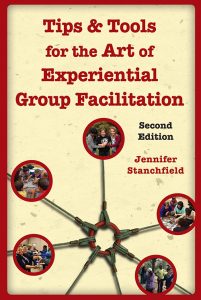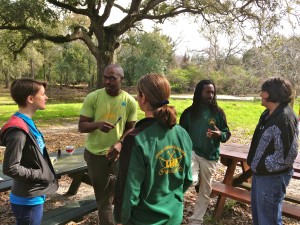Oct 25, 2016 Guiding Your Group: A Participant Centered Approach to Facilitation and Teaching

Excerpt from the new edition of Tips & Tools for the Art of Experiential Group Facilitation
The basic tenet of experiential education is the idea of facilitators (e.g., teachers, leaders) approaching their work as guides in the process of discovery, rather than as all-knowing centers of knowledge and direction. When working with educators and group leaders, I find myself encouraging them to reflect on the idea of a “learner-centered” view of teaching and group facilitation.
Using this approach, the educator aims to gradually shift responsibility for the success of the learning experience from themselves to the learner. As learners progress, the group facilitator fades more and more into the background, allowing participants to take more ownership and control over their learning. This balance has to be discovered and maintained with each experience and group of learners. In the participant-centered approach, facilitators pay attention to the progress of their groups. They are willing to step back and put forward as many questions as answers. The ability to be comfortable with the messiness or frustration of some group learning situations enables them to carve out time for meaningful, participant-centered resolutions to come to fruition (see Allow for Labor in Learning, page 110). They carefully observe and facilitate opportunities for ongoing reflection and feedback, so they know when they need to adjust their role to fit the needs of their group.

When individuals feel responsible for their learning and have achieved a challenge through their work, they are empowered to take ownership for future learning, growth, and change. Knowledge gained through such meaningful experience becomes lasting knowledge. When participants are given more responsibility for learning and group development, they gain a stronger sense of personal accomplishment for their successes.
Practices of a Participant-Centered Facilitator
•Create opportunities for participants to take leadership and responsibility for decision-making within group experiences. Remember the learner is a participant in learning rather than just a receiver of information.
•Make participant choice and control a priority. Empowering learners to set reasonable parameters and make decisions about their level of participation is essential to an atmosphere of healthy trust and increases involvement from reluctant participants.
•Encourage spontaneous learning; when possible go with the flow, and move with the lessons the group is creating.
•Plan and structure appropriate experiences but remain flexible, acting as guide and role model. Facilitators initiate learning; participants take it from there.
•Show learners they are fully valued, respected, and supported. •Encourage group members to share rather than calling on them. Allow participants to pass during group discussions, especially in the beginning, empowering them to have control over their learning and practice sharing at their own pace. They learn to trust the facilitator and group and often end up offering a great deal when they are ready.
•Be open to unexpected learning opportunities, and welcome teachable moments that arise when participants take a lesson in an unexpected direction. Be prepared to artfully navigate them back to the present moment in order to meet the group needs.
•Direct questions back to the group. Encourage participants to help each other.
•Incorporate experiences/activities that do not directly involve you as the leader (e.g., divide the group into partners or small groups for reflection discussions). Leaders don’t have to hear everything said in the group processing discussions for them to be effective. Trust the learning process.
•Be willing to let go of your agenda to meet the needs of the group, and welcome the opportunities that arise when group work goes differently than planned. Participants might discover ways to reach group goals that are new to you.
“A leader is best when people barely know he exists, not so good when people obey and acclaim him, worse when they despise him…. But of a good leader who talks little when his work is done, his aim fulfilled, they will say, ‘We did it ourselves’.” —Lao Tzu
Stanchfield, Jennifer (2016) Tips & Tools for the Art of Experiential Group Facilitation Second Edition. Bethany, OK: Wood N Barnes Publishing.



No Comments